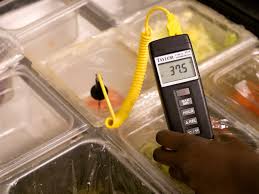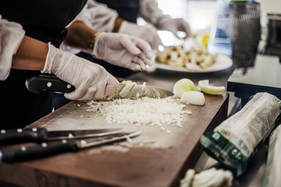
Food safety is critically important to you. As the owner of a food services establishment, you know that the key to ensuring that customers choose your restaurant over others is making sure that they feel comfortable. Serving food and drinks from a clean, safe kitchen is absolutely essential to your customers feeling comfortable - and that’s really what food inspectors are looking for. Our years of experience in oil recycling, kitchen hood cleaning, and grease trap maintenance in the Atlanta, Savannah, and Jacksonville markets positions Premier Grease as a key resource for ensuring that health inspectors find what they're looking for. Let’s take a look at the top five areas health inspectors look for in your kitchen.

Appropriately Cleansed and Sanitized Kitchen Equipment
Inspectors will look to ensure that pots, pans, dishes, and utensils are clean. But more importantly, they will look closely to make sure that you are practicing good kitchen hood cleaning, and grease trap maintenance. The National Restaurant Association recommends that kitchens clean large equipment, like range hoods and stove areas at least weekly.
High Level of Staff Hygiene
This is near the top of the list because it is the most important item that inspectors will look for. Ensure that your employees know that they must wash their hands after returning to the kitchen from outside of it, using the restroom, and after a variety of other activities within the kitchen. Additionally, make sure you have a specific sink set aside only for hand washing.
Proper Food Storage Temperatures and Locations
Food that must be heated and then chilled must be done so immediately. When it is rewarmed again, it must be brought to 165 degrees for at least 15 seconds. Additionally, food must be stored at least six inches from the ground...you can see where we’re getting here. The regulations surrounding food storage are extensive and for good reason. Not considering food storage can lead directly to food borne illness.
Reduce Cross-contamination
Ensure that your kitchen staff is appropriately cleaning and sanitizing any utensil or cookware that comes into contact with uncooked meat, poultry, dairy or other proteins before they are then used on other foods. Un- or under-cooked chicken is an excellent example of this. Anything that touches that chicken, including the counter on which it rests, must be thoroughly cleaned before it can be used again. It is important to bring in professional kitchen hood cleaners and grease cleaning services - such as Premier Grease - at least every few months to ensure that your kitchen stays clean and free from contaminates.
Staff & Manager Knowledge
Regardless of their primary language, staff and managers must be completely aware of food storage and handling rules, proper hand washing regiments, and sanitation procedures. Health inspectors will ask your employees simple questions to test their knowledge and ensure that they comply.
The checklist that food inspectors bring to your kitchen is vast - check your local health department’s website (here are the sites for Georgia and Florida) and use its regulation as your own checklist to appropriately prepare for their arrival.
Inspectors will look to ensure that pots, pans, dishes, and utensils are clean. But more importantly, they will look closely to make sure that you are practicing good kitchen hood cleaning, and grease trap maintenance. The National Restaurant Association recommends that kitchens clean large equipment, like range hoods and stove areas at least weekly.
High Level of Staff Hygiene
This is near the top of the list because it is the most important item that inspectors will look for. Ensure that your employees know that they must wash their hands after returning to the kitchen from outside of it, using the restroom, and after a variety of other activities within the kitchen. Additionally, make sure you have a specific sink set aside only for hand washing.
Proper Food Storage Temperatures and Locations
Food that must be heated and then chilled must be done so immediately. When it is rewarmed again, it must be brought to 165 degrees for at least 15 seconds. Additionally, food must be stored at least six inches from the ground...you can see where we’re getting here. The regulations surrounding food storage are extensive and for good reason. Not considering food storage can lead directly to food borne illness.
Reduce Cross-contamination
Ensure that your kitchen staff is appropriately cleaning and sanitizing any utensil or cookware that comes into contact with uncooked meat, poultry, dairy or other proteins before they are then used on other foods. Un- or under-cooked chicken is an excellent example of this. Anything that touches that chicken, including the counter on which it rests, must be thoroughly cleaned before it can be used again. It is important to bring in professional kitchen hood cleaners and grease cleaning services - such as Premier Grease - at least every few months to ensure that your kitchen stays clean and free from contaminates.
Staff & Manager Knowledge
Regardless of their primary language, staff and managers must be completely aware of food storage and handling rules, proper hand washing regiments, and sanitation procedures. Health inspectors will ask your employees simple questions to test their knowledge and ensure that they comply.
The checklist that food inspectors bring to your kitchen is vast - check your local health department’s website (here are the sites for Georgia and Florida) and use its regulation as your own checklist to appropriately prepare for their arrival.

 RSS Feed
RSS Feed